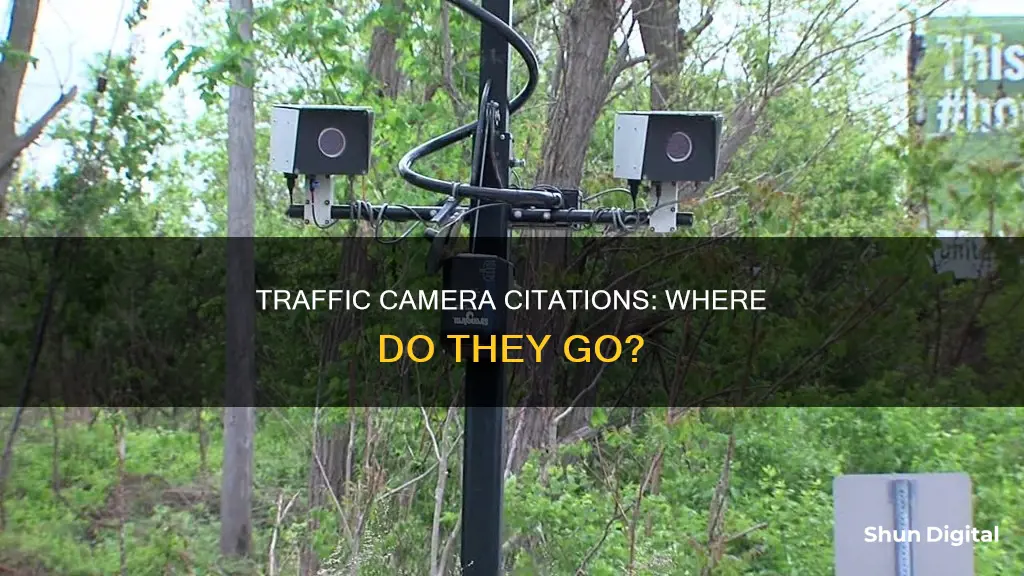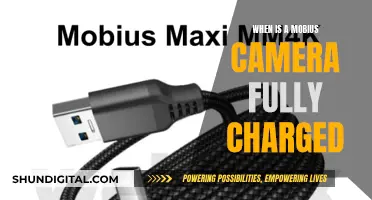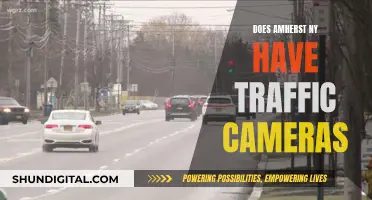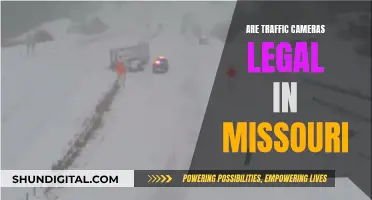
Traffic camera citations are a form of legal punishment for violating traffic laws. The punishment for a traffic camera citation depends on the type of violation and the driver's history, and laws vary depending on location. In most areas, traffic camera citations are the same as traffic tickets. Traffic camera citations are typically mailed to the registered owner of the vehicle, who is presumed to be the driver, within 10 to 90 days of the violation. The owner then has a period of time, usually 30 days, to respond to the citation.
| Characteristics | Values |
|---|---|
| Who is responsible for paying the fine? | The owner of the vehicle |
| What happens if you don't pay the fine? | Your citation will increase, and you may be sent to a debt collector |
| How much are fines? | Between $40 and $270 |
| How do you pay the fine? | By telephone, by mail, in person at a local court, or at a Motor Vehicle Administration office |
| How long do you have to respond to the citation? | 30 days |
| What happens if you weren't driving? | You can submit a Certificate of Innocence, or provide evidence that you weren't the driver |
What You'll Learn
- Traffic camera citations are mailed to the registered owner of the vehicle
- The owner then has a period of time, usually 30 days, to respond
- In some states, traffic camera citations carry the same penalties as a citation issued by an officer in person
- In other states, the penalties for a red light or speed camera ticket are less severe than for a non-camera citation
- If you weren't driving, you can submit a 'Certificate of Innocence' to have the citation dismissed

Traffic camera citations are mailed to the registered owner of the vehicle
Traffic camera citations are typically mailed to the registered owner of the vehicle within a certain period of time after the alleged violation. This period is usually between ten and 90 days. The citation is sent to the address associated with the vehicle on file with the Department of Motor Vehicles (DMV).
Once the registered owner receives the citation, they have a period of time, usually 30 days, to respond to it. The response options available to the registered owner depend on the jurisdiction. In some cases, they may be able to pay the fine associated with the citation online or by mail. In other cases, they may be required to appear in court to dispute the citation.
It is important to note that there is a presumption that the registered owner of the vehicle was the driver at the time of the violation. However, in most states, the registered owner has the opportunity to provide evidence that they were not the driver. For example, they may submit an affidavit stating the name and address of the person who was driving, or a police report if the vehicle was stolen. In some jurisdictions, submitting a sworn affidavit to the court is sufficient to have the citation dismissed, while in other states, the defendant may be required to appear in court to dispute the ticket.
The penalties for a traffic camera citation vary but are typically less severe than for a non-camera traffic citation. Generally, a conviction based on a camera enforcement system will result in a fine of $100 or less, and no demerit points will be added to the offender's driving record. However, in some states, a camera citation carries the same penalties as a citation issued by a law enforcement officer in person.
Charging Camera Batteries: A Step-by-Step Guide
You may want to see also

The owner then has a period of time, usually 30 days, to respond
When a traffic camera captures a violation, the footage is reviewed by a police officer who makes the final call on whether to issue a citation. If a citation is issued, it is mailed to the registered owner of the vehicle, who then has a period of time—usually 30 days—to respond.
The specific response process can vary depending on the type of violation and the location. In some cases, the owner may be required to appear in court to dispute the ticket. In other cases, they may be able to submit a sworn affidavit stating that they were not the driver at the time of the violation. The owner may also be required to provide additional documentation, such as a copy of their driver's license and a recent photograph of themselves.
It's important to note that the procedures for camera tickets vary by jurisdiction. For example, in Portland, Oregon, if the owner was not the driver at the time of the citation, they can submit a Certificate of Innocence along with a photocopy of their driver's license within 40 days of the incident. On the other hand, in San Francisco, California, the owner has to complete the portion of the citation that identifies the driver, attach a copy of their driver's license and a recent photograph, and return the documentation by mail within the specified timeframe.
Failing to respond to a traffic camera citation within the given timeframe can result in additional penalties and consequences, such as suspension of the vehicle owner's driver's license. Therefore, it is crucial to review the details of the citation carefully and take the necessary steps to respond within the allotted time.
Fighting Camera Tickets: Your Rights in New Orleans
You may want to see also

In some states, traffic camera citations carry the same penalties as a citation issued by an officer in person
Traffic camera citations are typically mailed to the registered owner of the vehicle within a certain period of time after the alleged violation. The time period for receiving the citation varies, but it can be anywhere from 10 to 90 days. The citation is sent to the address associated with the vehicle on file with the Department of Motor Vehicles (DMV).
Once the registered owner receives the citation, they have a limited amount of time to respond, usually around 30 days. The specific response options may differ depending on the state and the nature of the violation. For example, in Portland, Oregon, there are six different options to resolve a citation from a speed safety camera, including paying a fee to take a class and dismiss the citation, paying the citation online, or entering a plea of not guilty and requesting a trial.
It's important to note that the procedures for camera tickets vary by jurisdiction. However, in most areas, a person—typically a police officer—reviews the camera footage and makes the final call on whether to issue a citation.
While the penalties for a red light or speed camera ticket are often less severe than for a non-camera citation, in some states, a camera citation carries the same penalties as a citation issued by an officer in person. This means that the fines and points assessed against your driver's license may be the same as if you had been pulled over by a police officer.
Additionally, in some states, the registered owner of the vehicle is presumed to be the driver at the time of the violation. However, most states give the registered owner the opportunity to provide evidence that they were not the driver, such as an affidavit stating the name and address of the person who was driving.
Focusing Your Galaxy S9: Tips and Tricks
You may want to see also

In other states, the penalties for a red light or speed camera ticket are less severe than for a non-camera citation
In some states, the penalties for a red light or speed camera ticket are treated as non-moving violations, meaning they are on the same level as parking tickets or tickets for an expired registration. In these states, the fines for red light or speed camera tickets are relatively low, ranging from $40 to $250, and they are not added to the driver's record.
However, in other states, the penalties for a red light or speed camera ticket are more severe. For example, in Arizona, drivers receive two points for red light camera violations and three points for speeding camera violations. In California, drivers receive one point for red light camera infractions. In Oregon, a red light camera ticket is considered a Class B traffic violation, which can result in a maximum fine of $1,000.
It's important to note that even if a red light or speed camera ticket is not added to your driving record, it may still affect your car insurance rates. In most states, these types of tickets will not raise your insurance rates, but it's always a good idea to check with your insurance provider to be sure.
Additionally, it's worth mentioning that the process for disputing a red light or speed camera ticket can vary depending on the state and the specific circumstances of the violation. In some cases, you may be able to provide proof that you were not the driver at the time of the incident or explain mitigating circumstances for running a red light.
Accessing Computer Cameras: A Step-by-Step Guide
You may want to see also

If you weren't driving, you can submit a 'Certificate of Innocence' to have the citation dismissed
If you receive a citation from a speed safety camera, there are several options to resolve it. One of these options is to submit a Certificate of Innocence (COI) if you were not the driver at the time of the incident.
To submit a Certificate of Innocence, you must send a legible photocopy of the front and back of your driver's license, along with the certificate, to the relevant authority. In Portland, for example, you would send these documents to the Multnomah County Circuit Court. You can also usually submit the form online.
It is important to note that there is typically a time limit for submitting a Certificate of Innocence. For instance, in Portland, the completed certificate and photocopy of the driver's license must be received within 40 days of the incident date on the citation; otherwise, it will not be processed.
Once the Certificate of Innocence is submitted, the high-resolution images captured during the citation will be reviewed. If it is determined that you were not the driver, the citation against you will be dismissed. However, if it is found that you were indeed the driver, the citation will be mailed to you again.
Surveillance Cameras: Government's Watchful Eye on Citizens
You may want to see also
Frequently asked questions
If you receive a traffic camera citation, you should review the footage and images to verify the violation. You can then decide to pay the fine, contest the charge in traffic court, or explore other options such as taking a traffic safety class to dismiss the citation.
The time frame for responding to a traffic camera citation varies by jurisdiction. In some states, such as Colorado, residents have 30 days from the mailing date of the ticket to respond, while those registered outside the state have 60 days.
Failing to pay a traffic camera citation can result in increased fines and penalties over time. If you do not pay the ticket, it may be sent to a debt collector, and in some cases, it can lead to points on your driving and insurance records or even your criminal record.
The penalties for a traffic camera citation vary depending on the jurisdiction and the nature of the violation. Typically, the fines for a red light or speed camera ticket are less severe than for a non-camera traffic citation, usually amounting to $100 or less. In most states, no demerit points are added to the offender's driving record.







